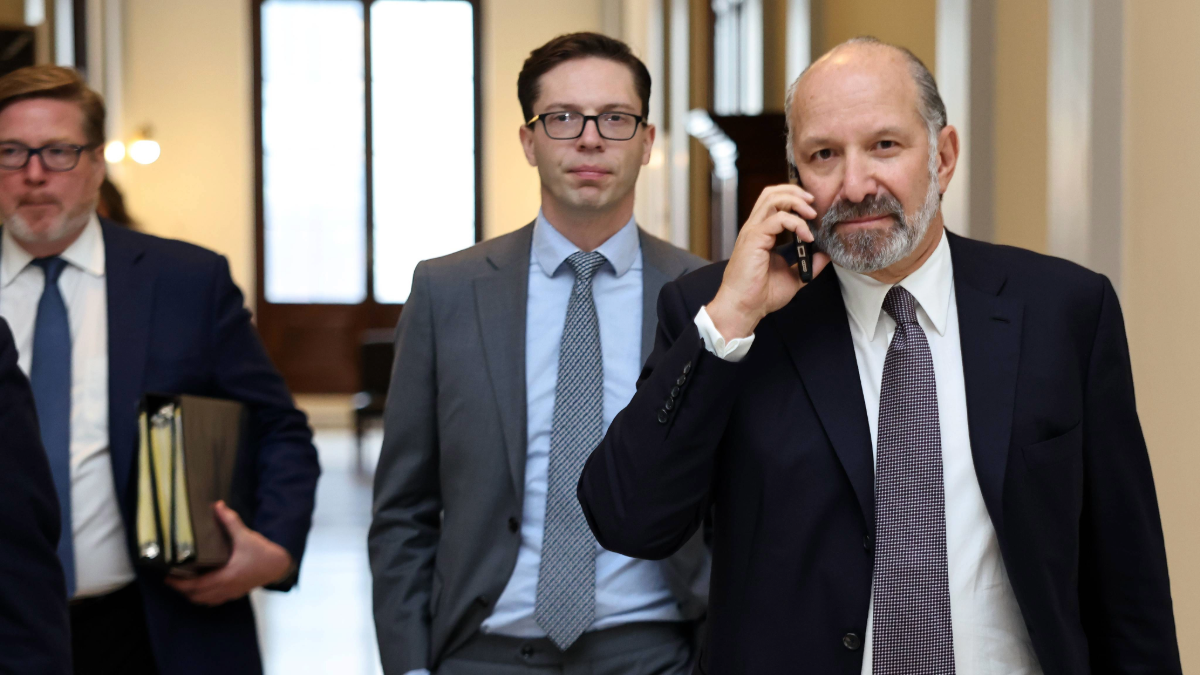What to Expect from Howard Lutnick’s Department of Commerce on Tech
David Paiz-Torres / Jan 22, 2025
WASHINGTON, DC - DECEMBER 11: Cantor Fitzgerald Chairman and CEO Howard Lutnick (R), US President Donald Trump's nominee for Secretary of Commerce, arrives for a meeting in the Russell Senate Office Building on Capitol Hill on December 11, 2024. (Photo by Chip Somodevilla/Getty Images)
President Donald Trump has tapped Howard Lutnick, a Long Island native and co-chair of his transition team, to be his Secretary for the Department of Commerce.
Before rising to President Trump’s orbit, Lutnick was most well-known for his role as the CEO who rebuilt Cantor Fitzgerald, a brokerage firm, in the aftermath of the September 11 attacks, which saw hundreds of Cantor Fitzgerald employees killed as the building was located in the World Trade Center. Lutnick’s executive portfolio also includes ventures in real estate and financial technology services.
If confirmed, Lutnick will play a key role in the US and China’s race for semiconductor and artificial intelligence supremacy. He will also be responsible for acting as an advisor on cryptocurrency regulation, implementing trade restrictions to avoid the transfer of certain technologies, and overseeing various policies regarding artificial intelligence.
AI and Trade Policy
In recent years, the commerce secretary has played a key role in implementing AI policy, but the priorities of the commerce department are expected to shift drastically under the new administration. While Lutnick has not made any public statements regarding AI, President Trump has already rescinded President Biden’s executive order on the “Safe, Secure and Trustworthy Development and Use of Artificial Intelligence.” The repeal will likely result in the dismantlement of the US AI Safety Institute, which requires companies to submit reports about how their models are trained.
Lutnick would also play a role in advocating on behalf of US tech firms on the global stage – a role which angered progressive democrats during the Biden administration when his commerce secretary criticized new European tech regulations.
Democratic Senator Ron Wyden has called Lutnick’s nomination into question because of this – citing potential conflicts of interest regarding his business dealings with a state-owned Chinese financial firm. “Mr. Lutnick’s conflicts of interest in China appear to be substantial. How can the American people expect someone who is on the Chinese government’s payroll to help level the playing field with China for working Americans?” asked Senator Wyden, according to Reuters.
Lutnick would be responsible for implementing – or dropping – a new rule that imposes significant restrictions on exporting advanced semiconductors. The new rule, proposed in the final days of the Biden administration, is aimed at reducing the potential for China to gain access to advanced semiconductor technology produced in the United States. However, the rule does not go into effect for 120 days, giving the incoming administration time to make changes or drop the new rule – which has been criticized by some industry leaders and US trading partners – altogether.
Lutnick has been described as a China Hawk, so it’s likely the new rule will go into effect, although it’s currently unclear if any changes will be made by the new administration. If changes are made, it's possible stricter export controls could be enacted. Though the president distanced himself from Project 2025, the chapter on the Department of Commerce calls for the International Trade Association – which falls under the purview of the Department of Commerce – to “counter the malign influence of China and other U.S. adversaries” and “defend against trade violations.” It further calls for a “new export control modernization effort to tighten the EAR policies governing licenses to countries of concern, including China and Russia.” The chapter, which was penned by former Assistant Secretary of Commerce Thomas F. Gilman, also calls for the implementation of artificial intelligence by the Trade Enforcement and Compliance Office to “prevent bad actors from gaming the system.”
Crypto
Lutnick is widely known as a cryptocurrency enthusiast, taking the podium last summer at the 2024 Bitcoin Conference. He also publicly vouched for the validity of the currency reserves of Tether Holdings, a cryptocurrency firm that was embroiled in a controversy after it was accused of not having enough USD assets to back its stablecoin. Lutnick was in a unique position to make such a claim, as Cantor Fitzgerald manages their assets and is “a primary dealer that gets to trade directly with the Federal Reserve,” according to CoinDesk.
If confirmed, Lutnick would play a key role as an advisor on cryptocurrency regulation as part of the government’s whole-of-government approach outlined in President Biden’s Executive Order on the responsible development of digital assets. This advisory role would see Lutnick collaborate with other federal officials on whether the Federal Reserve should establish its own digital currency.
On the campaign trail, President Trump vowed to establish a “strategic national bitcoin stockpile,” – a promise that has made news in recent days as the New York Post reported that Trump is considering establishing a cryptocurrency “strategic reserve.” The reserve would consist of Solana, USD Coin, and XRP. The Post article also noted that the President has met with the founders of those cryptocurrencies.
Broadband Access
While Lutnick has not been vocal on the Broadband Equity, Access, and Deployment (BEAD) program enacted by the Biden administration, some reports suggest there could be changes to the program. Crystal Tully, a Special Counsel at Wiley Rein, says that the new administration could shift away from fiber optic technology and move towards low Earth orbit satellites, according to Broadband Breakfast.
Three weeks after the election, Senator Ted Cruz – an ally of the president – and Chairman of the Senate Commerce Committee, sent a letter to the National Telecommunications and Information Administration urging them to halt the $42.5 billion BEAD program. Senator Cruz’s office indicated the BEAD program “will be investigated” and that “President-elect Trump has already signaled substantial changes are on the horizon for this program.” Senator Cruz also blasted the “technology mandates” of the program for “imposing excessive administrative burdens on the States.”
Authors
